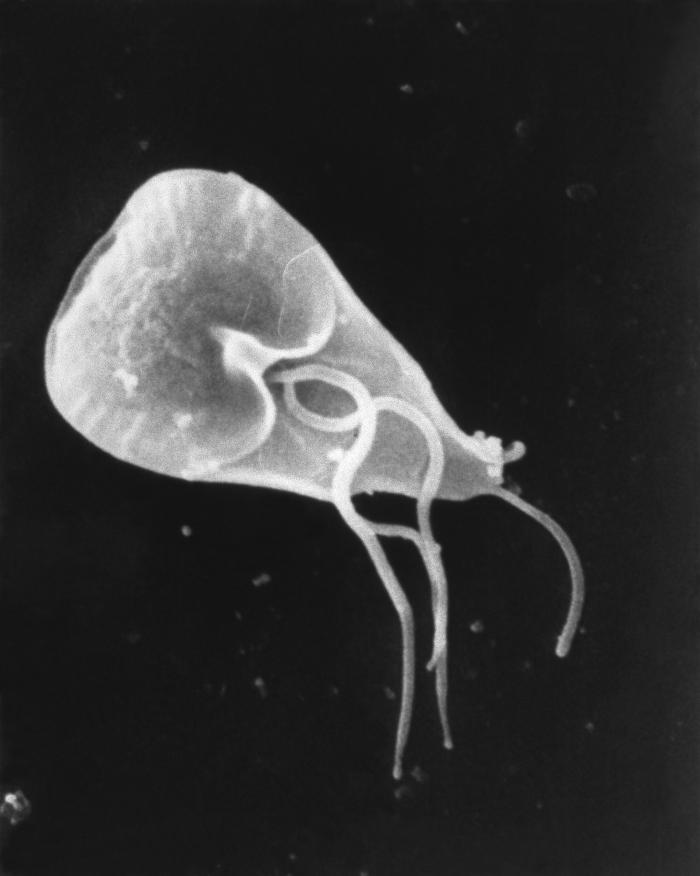- Giardiasis
Infobox_Disease
Name = PAGENAME

Caption = "Giardia" cell, SEM
DiseasesDB = 5213
ICD10 = ICD10|A|07|1|a|00
ICD9 = ICD9|007.1
ICDO =
OMIM =
MedlinePlus = 000288
eMedicineSubj = emerg
eMedicineTopic = 215
MeshID = D005873Giardiasis — popularly known as beaver fever or backpacker's diarrhea — is a disease caused by the flagellate protozoan "
Giardia lamblia " (also sometimes called "Giardia intestinalis" and "Giardia duodenalis"). [cite journal |author=Huang DB, White AC |title=An updated review on Cryptosporidium and Giardia |journal=Gastroenterol. Clin. North Am. |volume=35 |issue=2 |pages=291–314, viii |year=2006 |month=June |pmid=16880067 |doi=10.1016/j.gtc.2006.03.006 |url=http://linkinghub.elsevier.com/retrieve/pii/S0889-8553(06)00025-2] The giardia organism inhabits the digestive tract of a wide variety of domestic and wild animal species, including humans. It is a common cause ofgastroenteritis in humans, infecting approximately 200 million people worldwide.Transmission
Giardiasis is passed via the
fecal-oral route . Primary routes are personal contact and contaminated water and food. People who spend time in institutional or day-care environments are more susceptible, as are travelers and those who consume improperly treated water. It is a particular danger to peoplehiking or backpacking in wilderness areas worldwide. Giardia is suspected to bezoonotic —communicable between animals and humans. Major reservoir hosts includebeavers ,dogs ,cats ,horses ,cattle andbirds .ymptoms
Symptoms include loss of appetite, lethargy, fever, explosive diarrhea, hematuria (blood in urine), loose or watery stool, stomach cramps, upset stomach, projectile vomiting (uncommon), bloating, flatulence, and burping (often sulphurous). Symptoms typically begin 1–2 weeks after infection and may wane and reappear cyclically. Symptoms are caused by "Giardia" organisms coating the inside of the
small intestine and blocking nutrient absorption. Most people are asymptomatic; only about a third of infected people exhibit symptoms. Untreated, symptoms may last for six weeks or longer.Symptomatic infections are well recognised as causing
lactose intolerance ,cite journal |author=Pettoello Mantovani M, Guandalini S, Ecuba P, Corvino C, di Martino L |title=Lactose malabsorption in children with symptomatic Giardia lamblia infection: feasibility of yogurt supplementation |journal=J. Pediatr. Gastroenterol. Nutr. |volume=9 |issue=3 |pages=295–300 |year=1989 |pmid=2614615 |doi=] which, while usually temporary, may become permanent.cite journal |author=Wolfe MS |title=Giardiasis |journal=JAMA |volume=233 |issue=13 |pages=1362–5 |year=1975 |pmid=1174208|doi=10.1001/jama.233.13.1362] cite journal |author=Vega-Franco L, Meza C, Romero JL, Alanis SE, Meijerink J |title=Breath hydrogen test in children with giardiasis |journal=J. Pediatr. Gastroenterol. Nutr. |volume=6 |issue=3 |pages=365–8 |year=1987 |pmid=3430245 |doi=] Althoughhydrogen breath test s indicate poorer rates of carbohydrate absorption in those asymptomatically infected, such tests are not diagnostic of infection.cite journal |author=Moya-Camarena SY, Sotelo N, Valencia ME |title=Effects of asymptomatic Giardia intestinalis infection on carbohydrate absorption in well-nourished Mexican children |journal=Am. J. Trop. Med. Hyg. |volume=66 |issue=3 |pages=255–9 |year=2002 |pmid=12139217 |doi= |url=http://www.ajtmh.org/cgi/reprint/66/3/255 |format=PDF] It has been suggested that these observations are explained by symptomatic giardia infection allowing for the overgrowth of other bacteria.cite journal |author=Tomkins AM, Wright SG, Drasar BS, James WP |title=Bacterial colonization of jejunal mucosa in giardiasis |journal=Trans. R. Soc. Trop. Med. Hyg. |volume=72 |issue=1 |pages=33–6 |year=1978 |pmid=635972|doi=10.1016/0035-9203(78)90294-8]Some studies have shown that giardiasis should be considered as a cause of
Vitamin B12 deficiency , this a result of the problems caused within the intestinal absorption system. [{http://www.ncbi.nlm.nih.gov/pubmed/3458451?dopt=Abstract US Library of Medicine - Giardia causes B 12 Deficiency] ]Treatment
Drugs used to treat adults include
metronidazole ,albendazole andquinacrine .Furazolidone andnitazoxanide may be used in children. Treatment is not always necessary, as the body can defeat the infection by itself.The drug
tinidazole can treat giardiasis in a single treatment of 2000 mg, instead of the longer treatment of the other medications listed. The shorter duration of treatment may also cause less patient distress. Tinidazole is now approved by the FDA [http://www.fda.gov/Cder/consumerinfo/druginfo/tindamax.htm FDA info on Tindamax] .] and available to U.S. patients.Lab Diagnosis
* The mainstay of diagnosis of Giardiasis is stool microscopy. This can be for motile trophozoites or for the distinctive oval "G.lamblia" cysts.
* The entero-test uses a gelatin capsule with an attached thread. One end is attached to the inner aspect of the patient's cheek, and the capsule is swallowed. Later the thread is withdrawn and shaken in saline to release trophozoites which can be detected microscopically.
* A new immunologic test referred to as ELISA, for
enzyme-linked immunosorbent assay is now available. These tests are capable of a 90 percent detection rate or more. [ [http://www.yosemite.org/naturenotes/Giardia.htm#_ednref7 Giardia Lamblia and Giardiasis by Robert L. Rockwell, PhD ] ]* Because
Giardia lamblia is difficult to detect, often leading to misdiagnoses, it is advised that several tests be conducted over a one week time period. [ [http://www.cdc.gov/ncidod/dpd/parasites/Giardiasis/factsht_giardia.htm#diagnosed Center for Disease Control - Parasite division - Giardia] ]References
ee also
*
Wilderness diarrhea External links
* [http://www.cdc.gov/ncidod/dpd/parasites/giardiasis/factsht_giardia.htm Giardiasis Fact Sheet]
* [http://www.emedicinehealth.com/articles/17334-1.asp eMedicine Health Giardiasis]
Wikimedia Foundation. 2010.
